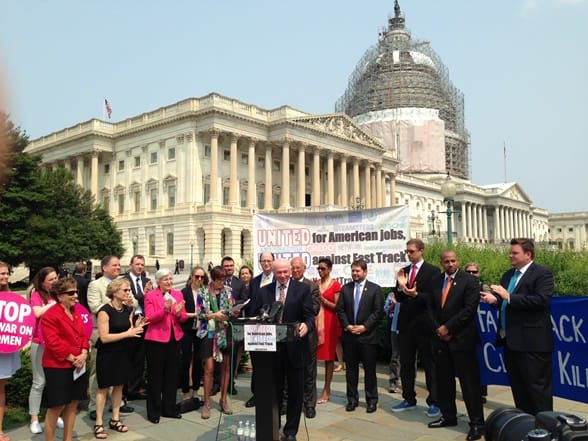Lessons from Today’s Trade Drama: Hands Off Medicare



Obama spent roughly 45 minutes with Democratic lawmakers, taking no questions but telling his party to “vote your values,” according to a source in the room.
But Democratic lawmakers rebuffed him hours later, voting overwhelmingly to scuttle the trade package that was a centerpiece of the president’s second-term agenda. Minority Leader Nancy Pelosi (D-Calif.), who had remained silent for weeks on the trade issue, went to the House floor shortly before the vote to speak against the free trade deal.
“Whatever the deal is with other countries,” she said, “we want a better deal for America’s workers.”
The House could re-vote on TAA next week. House Republican leaders say they have 100 votes for that bill, and Democrats need to provide 118. On Friday, Democrats provided 40, while 86 Republicans supported it. In other words, Democrats would need to essentially triple their their vote total to pass the measure. Dems Deal President Huge Defeat – Politico
However, in the House nothing is ever simple and that vote isn’t the end of the story. NCPSSM has urged Members of Congress there is one important lesson from today’s drama – Hands Off Medicare.
“In spite of all the political sleight of hand and twisting of the legislative process into a pretzel to pass the trade package, there is one clear lesson today: Medicare does not belong in the trade debate. Period. Trade Adjustment Assistance legislation failed in large part because it was burdened with a pay-for the American people simply do not support. American workers deserve to have job training assistance through reauthorization of the TAA; however, demanding that important proposal be paid for by cutting $950 million dollars from Medicare poisoned the process.
Using Medicare to fund unrelated programs is a relatively new yet growing trend in Congress that simply must stop. Medicare isn’t Washington’s ATM. The American people understand this. Hopefully, Members of Congress have learned that lesson and won’t make the same mistake again when the trade debate resumes.” …Max Richtman, NCPSSM President/CEO
House Leaders Hope Political Smoke and Mirrors will Hide Medicare Cuts in Trade Bill
With an expected House vote tomorrow on controversial trade legislation supported by the President and the Senate, House leadership of


Members of the Congressional Progressive Caucus and the Congressional Task Force on Seniors have led the charge against this proposal:
“10,000 people a day turn 65. We should be investing and expanding Medicare not stealing from it. People have paid into this program and expect it to be there…not to use that to fund anytime we need money to pay for another program…Medicare is not the ATM for everything Congress wants to pay for. Cutting this social insurance program isn’t the direction we should be going in. Medicare should not be the pay-for for trade deal. The best way to help workers is to stop trade deals that take their jobs…not cut Medicare to fund fixes.” Rep. Jan Shakowsky (D-IL)
“There’s going to be untold riches earned if TPP is enacted into law. There’s no doubt about that. Great profits will be derived for large international corporations…it seems only logical that the multinationals should fund the costs of the Trade Adjustment Assistance. I can not abide this. We’ll fight it with everything we have.” Keith Ellison (D-MN)
That pressure has worked as more and more Members now realize what is included in this trade vote and this week voiced their opposition to using Medicare as an ATM to pay for Trade Adjustment Assistance legislation.
However, rather than go back to the drawing board, House leaders have now crafted a political sleight of hand designed to pass TAA while providing Members of Congress political coverage for cutting Medicare. This is a segment of NCPSSM’s letter to Congress today and comments from NCPSSM President/CEO, Max Richtman:
“Although Representative Paul Ryan’s amendment to H.R. 1295, the “Trade Preferences Extension Act of 2015,” would remove the Medicare sequester from H.R. 1314, there is no guarantee that the Senate will approve this amendment. In addition, the Ryan amendment is flawed because it does not remove the Medicare dialysis provision from H.R. 1314.
We believe that this scheme amounts to a shell game which will force you and your colleagues to be on record with a vote to cut a program that is supported overwhelmingly by Americans of all political affiliations and age groups. What’s more, it sets a dangerous precedent of treating Medicare as a piggybank to pay for unrelated programs. Savings from changes in Medicare policy should be used to improve Medicare – not for other purposes.”
“For millions of seniors and their families a vote to cut Medicare is a vote to cut Medicare. Period. There is no political sleight of hand that will provide Members of Congress protection on election day for a vote which raids Medicare to pay for the trade bill.
Cutting Medicare to pay for everything else under the sun has become a habit that Congress needs to break. This trade vote is the perfect time to do it.
Medicare isn’t Washington’s ATM. The American people understand this. Members of Congress who don’t will undoubtedly be reminded very clearly by their political opponents and voters come Election Day.”…Max Richtman, NCPSSM President/CEO



GOP Priorities for Social Security are Clear



The Center on Budget and Policy Priorities details what these budget cuts mean for a program that touches the lives of virtually every American family:
Since 2010, SSA has lost over 6,000 employees, nearly 10 percent of its staff. As a result, SSA’s service is suffering:
- Reduced field office hours.
- Increased wait times for appointments.
- Longer hold times.
- Cutbacks in Social Security Statements.
- Backlogged Disability Insurance claims.
- Delays in processing earnings reports.
Logically, you’re probably wondering how is an agency serving a growing number of Americans (and it’s not like the baby boomer generation is a surprise) be expected to do its job with no resources? The answer lies in the long-held “starve the beast” and “drown-the-government” conservative strategy still being practiced, decades later, by GOP leaders in Congress.
“I don’t want to abolish government. I simply want to reduce it to the size where I can drag it into the bathroom and drown it in the bathtub.” Grover Norquist
Social Security is well-managed with small administrative costs. However, underfunding popular programs that conservatives can’t outright abolish or dismantle (if they hope to keep their seats in Congress, anyway) continues to be used as a political strategy to weaken Social Security. This underfunding has now been going on long enough that Social Security services provided to average Americans have been cut to the bone.
Who ultimately pays the price for this political strategy? Average American families who have contributed their entire working lives to Social Security and have a reasonable expectation that the SSA would be funded by Congress to successfully fulfill its mission…as it has done for 80 years.
National Seniors’ Coalition Transfers Chairmanship to NCPSSM
NCPSSM President/CEO, Max Richtman, Assumes Chairmanship of the Leadership Council of Aging Organizations
“For too many years our nation’s most successful retirement and health security programs have been under almost constant assault by those who hope to cut these programs to pay for a myriad of other purposes – from tax cuts and deficit reduction to trade deals. These attacks come at a time when 10,000 Americans turn 65 each day, our nation faces a retirement crisis and the need for Social Security, Medicare, Medicaid and Older Americans Act programs is growing. With so much at stake and a stormy political climate ahead, the National Committee is proud to take over the leadership of the Leadership Council of Aging Organizations continuing the LCAO’s important work on behalf of America’s seniors. We’re at a critical time in history and the LCAO will lead the effort to strengthen programs seniors and their families depend on.”…Max Richtman, NCPSSM President/CEO
The 72 senior advocacy groups that comprise the Leadership Council of Aging Organizations have spent decades educating and advocating on behalf of the nation’s senior citizens. From Social Security to long-term care issues, the LCAO has been a leading voice in the debate on how best to serve America’s senior population—current and future. This year will be especially busy for the LCAO as 2015 marks Medicare’s 50th anniversary and the 80th anniversary for Social Security. The White House Conference on Aging is also being held this year with LCAO organizations engaged nationwide and playing a leadership role to ensure seniors’ voices play an important role in the event.
Max Richtman’s one-year chairmanship begins June 3rd.



Lessons from Today’s Trade Drama: Hands Off Medicare



Obama spent roughly 45 minutes with Democratic lawmakers, taking no questions but telling his party to “vote your values,” according to a source in the room.
But Democratic lawmakers rebuffed him hours later, voting overwhelmingly to scuttle the trade package that was a centerpiece of the president’s second-term agenda. Minority Leader Nancy Pelosi (D-Calif.), who had remained silent for weeks on the trade issue, went to the House floor shortly before the vote to speak against the free trade deal.
“Whatever the deal is with other countries,” she said, “we want a better deal for America’s workers.”
The House could re-vote on TAA next week. House Republican leaders say they have 100 votes for that bill, and Democrats need to provide 118. On Friday, Democrats provided 40, while 86 Republicans supported it. In other words, Democrats would need to essentially triple their their vote total to pass the measure. Dems Deal President Huge Defeat – Politico
However, in the House nothing is ever simple and that vote isn’t the end of the story. NCPSSM has urged Members of Congress there is one important lesson from today’s drama – Hands Off Medicare.
“In spite of all the political sleight of hand and twisting of the legislative process into a pretzel to pass the trade package, there is one clear lesson today: Medicare does not belong in the trade debate. Period. Trade Adjustment Assistance legislation failed in large part because it was burdened with a pay-for the American people simply do not support. American workers deserve to have job training assistance through reauthorization of the TAA; however, demanding that important proposal be paid for by cutting $950 million dollars from Medicare poisoned the process.
Using Medicare to fund unrelated programs is a relatively new yet growing trend in Congress that simply must stop. Medicare isn’t Washington’s ATM. The American people understand this. Hopefully, Members of Congress have learned that lesson and won’t make the same mistake again when the trade debate resumes.” …Max Richtman, NCPSSM President/CEO
House Leaders Hope Political Smoke and Mirrors will Hide Medicare Cuts in Trade Bill
With an expected House vote tomorrow on controversial trade legislation supported by the President and the Senate, House leadership of


Members of the Congressional Progressive Caucus and the Congressional Task Force on Seniors have led the charge against this proposal:
“10,000 people a day turn 65. We should be investing and expanding Medicare not stealing from it. People have paid into this program and expect it to be there…not to use that to fund anytime we need money to pay for another program…Medicare is not the ATM for everything Congress wants to pay for. Cutting this social insurance program isn’t the direction we should be going in. Medicare should not be the pay-for for trade deal. The best way to help workers is to stop trade deals that take their jobs…not cut Medicare to fund fixes.” Rep. Jan Shakowsky (D-IL)
“There’s going to be untold riches earned if TPP is enacted into law. There’s no doubt about that. Great profits will be derived for large international corporations…it seems only logical that the multinationals should fund the costs of the Trade Adjustment Assistance. I can not abide this. We’ll fight it with everything we have.” Keith Ellison (D-MN)
That pressure has worked as more and more Members now realize what is included in this trade vote and this week voiced their opposition to using Medicare as an ATM to pay for Trade Adjustment Assistance legislation.
However, rather than go back to the drawing board, House leaders have now crafted a political sleight of hand designed to pass TAA while providing Members of Congress political coverage for cutting Medicare. This is a segment of NCPSSM’s letter to Congress today and comments from NCPSSM President/CEO, Max Richtman:
“Although Representative Paul Ryan’s amendment to H.R. 1295, the “Trade Preferences Extension Act of 2015,” would remove the Medicare sequester from H.R. 1314, there is no guarantee that the Senate will approve this amendment. In addition, the Ryan amendment is flawed because it does not remove the Medicare dialysis provision from H.R. 1314.
We believe that this scheme amounts to a shell game which will force you and your colleagues to be on record with a vote to cut a program that is supported overwhelmingly by Americans of all political affiliations and age groups. What’s more, it sets a dangerous precedent of treating Medicare as a piggybank to pay for unrelated programs. Savings from changes in Medicare policy should be used to improve Medicare – not for other purposes.”
“For millions of seniors and their families a vote to cut Medicare is a vote to cut Medicare. Period. There is no political sleight of hand that will provide Members of Congress protection on election day for a vote which raids Medicare to pay for the trade bill.
Cutting Medicare to pay for everything else under the sun has become a habit that Congress needs to break. This trade vote is the perfect time to do it.
Medicare isn’t Washington’s ATM. The American people understand this. Members of Congress who don’t will undoubtedly be reminded very clearly by their political opponents and voters come Election Day.”…Max Richtman, NCPSSM President/CEO



GOP Priorities for Social Security are Clear



The Center on Budget and Policy Priorities details what these budget cuts mean for a program that touches the lives of virtually every American family:
Since 2010, SSA has lost over 6,000 employees, nearly 10 percent of its staff. As a result, SSA’s service is suffering:
- Reduced field office hours.
- Increased wait times for appointments.
- Longer hold times.
- Cutbacks in Social Security Statements.
- Backlogged Disability Insurance claims.
- Delays in processing earnings reports.
Logically, you’re probably wondering how is an agency serving a growing number of Americans (and it’s not like the baby boomer generation is a surprise) be expected to do its job with no resources? The answer lies in the long-held “starve the beast” and “drown-the-government” conservative strategy still being practiced, decades later, by GOP leaders in Congress.
“I don’t want to abolish government. I simply want to reduce it to the size where I can drag it into the bathroom and drown it in the bathtub.” Grover Norquist
Social Security is well-managed with small administrative costs. However, underfunding popular programs that conservatives can’t outright abolish or dismantle (if they hope to keep their seats in Congress, anyway) continues to be used as a political strategy to weaken Social Security. This underfunding has now been going on long enough that Social Security services provided to average Americans have been cut to the bone.
Who ultimately pays the price for this political strategy? Average American families who have contributed their entire working lives to Social Security and have a reasonable expectation that the SSA would be funded by Congress to successfully fulfill its mission…as it has done for 80 years.
National Seniors’ Coalition Transfers Chairmanship to NCPSSM
NCPSSM President/CEO, Max Richtman, Assumes Chairmanship of the Leadership Council of Aging Organizations
“For too many years our nation’s most successful retirement and health security programs have been under almost constant assault by those who hope to cut these programs to pay for a myriad of other purposes – from tax cuts and deficit reduction to trade deals. These attacks come at a time when 10,000 Americans turn 65 each day, our nation faces a retirement crisis and the need for Social Security, Medicare, Medicaid and Older Americans Act programs is growing. With so much at stake and a stormy political climate ahead, the National Committee is proud to take over the leadership of the Leadership Council of Aging Organizations continuing the LCAO’s important work on behalf of America’s seniors. We’re at a critical time in history and the LCAO will lead the effort to strengthen programs seniors and their families depend on.”…Max Richtman, NCPSSM President/CEO
The 72 senior advocacy groups that comprise the Leadership Council of Aging Organizations have spent decades educating and advocating on behalf of the nation’s senior citizens. From Social Security to long-term care issues, the LCAO has been a leading voice in the debate on how best to serve America’s senior population—current and future. This year will be especially busy for the LCAO as 2015 marks Medicare’s 50th anniversary and the 80th anniversary for Social Security. The White House Conference on Aging is also being held this year with LCAO organizations engaged nationwide and playing a leadership role to ensure seniors’ voices play an important role in the event.
Max Richtman’s one-year chairmanship begins June 3rd.






